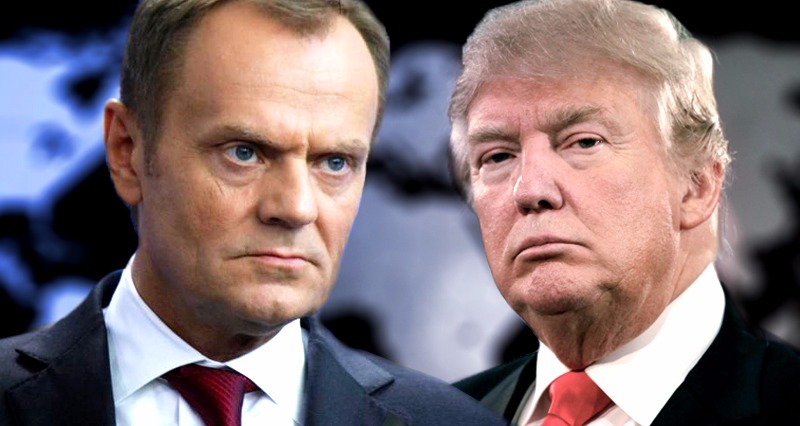In a heated speech delivered in Krakow on October 6th, the ex-Polish PM turned European Council President, Donald Tusk, let loose an extremely telling admission: “Never before in my life has America been a problem for Europe. What has happened under the administration of my namesake, Donald Trump, is a new phenomenon – America is sailing away from Europe today and it is intentional.”
Thus, Tusk painted a picture of the European Union, which he called “the most beautiful political undertaking in Europe’s history”, besieged on all sides: by Russia, “which is undermining whatever it can undermine in Europe”; by the United States, which is mistreating and abandoning its yesterday’s loyal Transatlantic vassals; by “a mouthful of nationalistic slogans” and “nauseating rhetoric” within European public opinion on demographic and cultural policies; and by socio-political shifts, such as within Tusk’s former homeland, which are supposedly threatening “very fragile and unique liberal democracy.”
Tusk’s speech, at the risk of giving the EU figurehead too much credit, is a seminal index of both the current geopolitical crisis facing Europe and the mentality of the Brussels elite amidst this uncertain “time of troubles.” Quite naturally, the majority of media attention to Tusk’s speech has been devoted either to the “nauseating rhetoric” of Tusk’s virulent tirade and string of unsubstantiated accusations against Russia, or to the local, i.e., Polish context of Tusk’s address. While both of these aspects are indeed relevant, it is Tusk’s “American lamentations” that are most ripe and relevant for fresh analysis.
In the final analysis, Donald Tusk’s expressed concerns are markers of two primary processes that are shaking the foundations of the European Union and defining the 21st century: (1) the crisis of the Atlanticist project, upon which the EU has been existentially predicated for the past half-century, now being undermined by Donald Trump’s effort to strategically reform US geopolitical priorities; and (2) the unpreparedness of the EU elite to reconsider basic geopolitical realities and adopt a genuinely European apperception in the face of this geopolitical revolution. I have already belabored these two points on a number of occasions elsewhere, so here I propose to examine another aspect of the second reality: namely, the unpreparedness of the EU elite for what the US has in store for Europe as part of its strategic retreat.
Since June, Washington has gradually revealed its agenda for the Continent. Trump has made it clear that the US intends to exact tribute from its European “friends” and alter trade dynamics by imposing tariffs and pressuring EU businesses to trail the US’ economic war on Russia, China, Iran, and Turkey. While some may have written off this “trade war” as merely an economic ebb or showmanship on Trump’s part, Trump’s most recent statement gives every reason to believe that the US’ economic offensive is a force here to stay. Speaking to CBS, Trump declared that “nobody treats us much worse than the European Union”, and boldly asserted that “The European Union was formed in order to take advantage of us on trade, and that’s what they’ve done.” Extending his critique of Atlanticism from the political-economic face of the EU to the military front of NATO, Trump not only suggested for the umpteenth time that he considers the bulk of NATO costs to be unfairly shouldered by the US, but played his hand even further in saying that “They‘re not going to do it anymore. They understand that.”
In other words, not only does Trump intend to further his program of geo-economic austerity, but he has openly challenged EU policy-makers by calling them out on their own dilemma, on their very unpreparedness or unwillingness to accept that the US-EU Transatlantic relationship is being drastically transformed on America’s initiative. Donald Tusk confirmed Trump’s “claim” in admitting that “America is sailing away from Europe today and it is intentional.”
In this context, Trump’s mention of NATO is highly significant, as such indicates that the US’ strategic power-play will not be confined to the economic side of the Atlanticist project, but will directly, consciously affect the military-geopolitical dimension as well. While many analysts remain convinced that Trump’s attempts on this front will likely fail due to immense resistance on the part of the US Deep State, whose raison d’etat has been the Atlanticist project for nearly a century, there is no convincing reason to discount the possibility that the US might gradually opt to involve “military-political” measures in its “negotiations” with Europe as well.
The US, after all, has not only been at war for approximately 242 years, or 95% of its historical existence, but is also the tried-and-tested champion of adaptive modes of covert warfare that have been distinguished and termed in a number of ways, ranging from “Fourth Generation Warfare”, to “Hybrid War”, to “Proxy War”, to “Color Revolution”, “Regime Change”, etc. The US has also mastered the art of deception by obfuscating these practices behind slogans of “democracy” and “human rights”, which European states have, by virtue of various historical factors, internalized.
Taking into consideration Trump’s increasingly acute treatment of the EU as a rival, the EU’s fumbling crisis of structure and direction which has seen growing disputes between Brussels and member-states as well as within national establishments, and in light of the deployment of US troops and arms in the Atlanticist “flanks” of the EU, i.e., in Poland, Romania, the Baltic states, the Balkans, and Ukraine, all the pieces are gradually being set in place for potential operations aimed at strategically encompassing and paralyzing the European Union during the US’ attempt at geopolitical reform.
We can also add to this list Washington’s increasing withdrawal from the international institutions and agreements that historically regulated these factors by institutionally fixing the Atlanticist project in international relations, which Washington is now trying to disown, and the dispatch of Steve Bannon as a “political tourist in Europe”, whose activities strongly suggest that Washington is forging contacts with the “European populisms” that just yesterday were accused of being aligned with Russia by virtue of their opposition to certain elements of Atlanticism in Europe.
In the end, the picture that emerges is one of the EU helplessly bemoaning its “besieging” on all sides, senselessly floundering in empty rhetoric on the need for “tolerance” and “unity”, and being left in suspense on the note of Trump’s checkmate statement that European leaders “understand” what is conspiring. All the while, the US is working to assure that it has puppet states, armed forces, political contacts, and the economic upper hand all in its hands for when, or rather if, European Union structures finally realize and attempt to practically address their dire prospects. In this context, the proclamations of certain European leaders that the EU can and must take up the mantle of the Atlanticist project and become a “global leader” on its own look tragically ludicrous.
In the present global transition towards a multipolar system of international relations, which hardly anyone still dares to dispute, and amidst the immense stakes of the US’ ambitious MAGA project, the only thing preventing a realistic posing of the possibility of heightened Transatlantic conflict is the echo-chamber and blind-alley ideology of Atlanticism that has been on its way out. To be clear, I am not suggesting that a hot conflict between the US and EU is in the cards, as neither the US nor the EU have the capability of waging or winning such a conflict, nor is it likely that the emerging multipolar system would allow for things to reach such a point.
What is likely, however, is that the US and EU are only going to collide more across a whole spectrum of issues, and the fact remains that the US boasts a highly-developed arsenal of destabilization and hybrid tactics for shaping antagonisms in its own favor. Indeed, the US seems to be preparing for such. But the EU, meanwhile, as its Commission president, Council president, and the recent situation surrounding PACE have all demonstrated, is still buying the US’ bluff and worrying about Russia. In fact, official EU policy-making and rhetoric seems to still be following the US’ 2017 National Security Strategy, from which Trump himself has long since departed.
It would be incredibly naive to assume that the US’ “sailing way” means that Washington will quietly shrink back from the Continent and leave Europe unscathed. Instead, as the above-mentioned factors indicate, the US is likely to use the remnants of Transatlanticist institutions, such as NATO, to maintain a significant military wedge in Europe, to continue to demand “re-compensation” for its selective “policing” while trying to offset the costs to junior partners, and to prevent any feasible rapprochement between EU states and Russia.
The fact that the US, while hoisting its masts to “sail away”, has thrown its support to a number of “last-minute” Atlanticist projects around Europe, such as NATO expansion in the Balkans, the establishment of a permanent US Army base in Poland in addition to missile systems, and the deterioration of relations with Turkey, suggests that Washington is forming a ring of pressure points around the EU to ensure that the latter has no room for sovereign maneuvering with regards to its own neighbors and even members. In geopolitical terminology, the US is still acting faithfully to the Anglo-Saxon school of geopolitical logic which sees Europe as “Rimland”, i.e., a peripheral zone which must be strategically hegemonized, even if no longer outright occupied or “externally managed”.
If the EU is really supposed to be “the most beautiful political undertaking in Europe’s history”, then its actors will have to realize sooner rather than later that Europe is being slated to be an object of terms of geopolitical re-arrangements which are not of its own making, are not in its strategic-cultural interests, and in which there is no room envisioned for a truly sovereign union of European states. In order to realize and address this existential problem, European policy-makers have to shed their souring Junckerian romance with Atlanticism and deliberate a strategy that takes into consideration the real dilemmas confronting it in the increasingly post-Atlanticist world order.
One of the major stumbling blocks towards establishing such a sustainable European apperception is abandoning the ideological pretense that what Trump is pursuing vis-a-vis Europe is an irrational, idealist ambition that contradicts the present order of international relations.
On the contrary, Trump’s “Make America Great Again”, beyond all the mainstream media disinformation and beyond “right” and “wrong” or “right” and “left”, is based on a realist assessment of the US Empire’s decline and a logical restructuring of US geopolitics intended to preserve the US as a major player through the turbulent global shift towards a multipolar world. Historically speaking, Trump’s project has significant, albeit neglected precedents in the history of American statehood. The sooner that EU political discourse soberly comes to grips with this, the greater the chances that the European Union will be able to sensibly and intentionally determine its role in the multipolar world of the 21st century based on its own histories of statehood.

















Leave a Reply